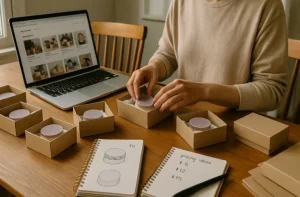I Want to Start a Business But Have No Ideas | Top Innovative Ways

Not having a business idea when you’re ready to start your own venture might feel like a roadblock. But in reality, it’s a powerful place to begin. Many successful entrepreneurs started out not with a perfect plan, but with a blank slate. That space for exploration is where true innovation begins.
Whether you’re in the UK trying to break out of your 9-to-5 or simply itching to create something of your own, this blog will walk you through how to unlock entrepreneurial ideas step by step, even when you feel like you have none.
This isn’t just theory. It’s built on insights from the UK’s top business minds and real examples of people who went from “no clue” to thriving founders. If you’ve ever said “I want to start a business but have no ideas,” this guide is for you.
Why Is Having No Idea a Good Starting Point?
Many assume they need a perfectly formed business concept before taking their first step. In truth, that expectation can limit potential. Starting with no idea allows you to remain open to trends, adapt faster to the market, and stay flexible as opportunities arise.
Plenty of successful ventures began with curiosity, not clarity. Entrepreneurs often dive into fields they’re merely interested in and allow the market to shape what their business becomes.
For instance, some might start with a single service or product, see what gains traction, and then evolve it into a business based on real feedback and demand.
Having no concrete idea also means you’re not tied down. You can explore multiple areas, test things out, and pivot when needed. It’s a mindset that welcomes growth, not perfection.
Are You Missing a Market Gap Others Aren’t Seeing?

Great businesses don’t always invent, they improve or fill gaps others overlook. Start by studying customer reviews on products or services you already use. Pay special attention to what people dislike or wish existed.
Look at local communities or niche industries. Are there services that aren’t accessible in your area or products people are DIY-ing out of necessity? These indicators often point to demand that’s not being met.
Conducting a simple market gap analysis can also help. You might notice that while there are several coffee shops in town, none cater specifically to freelancers who need a quiet work environment. That’s a business opportunity waiting to happen.
Successful brands like Dollar Shave Club and Monzo gained traction by identifying inefficiencies and serving needs more simply, affordably, or in a more personalised way.
I Want to Start a Business But Have No Ideas – Step by Step
Feeling stuck without a clear business idea doesn’t mean you’re unfit for entrepreneurship, it just means you haven’t unlocked the right path yet.
Rather than waiting for inspiration to strike, follow this structured step-by-step approach. It’s designed to help you move from confusion to clarity, and eventually, into confident action.
Step 1: Self-Assessment

Before you look outward for ideas, take a moment to reflect on who you are. Consider your past experiences, both professional and personal. What skills come naturally to you? What do you genuinely enjoy doing, even without being paid for it?
You might be great at organising, enjoy creative writing, or feel fulfilled when helping others solve problems. Also, pay attention to what friends or colleagues often come to you for. These signs point toward strengths you can build a business around.
Make two simple lists: one of your passions and one of your strongest skills. See where they overlap. That sweet spot is often where viable, satisfying business ideas begin to take shape.
Step 2: Market Observation

Once you have a sense of what you’re good at and what drives you, shift your focus outward. The goal here is to find out what people actually need or want, and where current solutions fall short.
Browse forums like Reddit, scroll through online reviews, and join community groups. What are people complaining about? Are there services missing in your area? Could you deliver something faster, more affordably, or with a better customer experience?
For example, you might find that many local parents struggle to find reliable after-school tutors. If you have a background in education, that could be your opening. Observing market gaps helps you align your strengths with real-world demand.
Step 3: Learning and Upskilling

Now that you’ve pinpointed an area of interest and potential need, it’s time to build confidence and competence. Enrol in an affordable online course, attend a local workshop, or follow thought leaders in your chosen field.
Whether it’s learning how to use digital marketing tools, understanding how to set up an eCommerce shop, or mastering public speaking, every new skill expands your ability to turn an idea into something tangible.
Remember, you don’t need a degree or years of experience, you just need enough knowledge to get started. Learning also gives you the confidence to take the next step with less fear of the unknown.
Step 4: Small-Scale Experimentation

Here’s where you stop planning and start doing, but on a small, manageable scale. This might mean launching a simple version of your product, offering your service to friends or neighbours, or creating a test page online to see who’s interested.
You don’t need a website or a brand to begin. You just need to offer value and observe how people respond. Use this phase to gather feedback and notice what resonates. It’s not about perfection; it’s about validation.
For instance, if you’re testing a dog-walking service, offer a few free sessions in your neighbourhood. If the response is strong, you’re onto something. If not, tweak the offer based on what people actually want.
Step 5: Refine and Launch

Now that you’ve tested your idea and collected real-world feedback, it’s time to refine it. Tweak your pricing, service details, or delivery model based on what worked, and what didn’t.
Once you feel confident that your idea solves a genuine need and has some traction, move forward with launching more officially. This includes setting up your business legally, registering a name, and perhaps building a simple website or social media presence.
You don’t have to launch big. Starting lean and smart is the best way to stay adaptable. Focus on steady growth, continuous improvement, and always listening to your customers.
What Are Some Low-Investment Business Ideas You Can Start Now?
For many aspiring entrepreneurs, the thought of starting a business often feels out of reach due to one factor, money. However, not all businesses require large amounts of capital or expensive equipment to get off the ground.
In fact, with the rise of digital tools, online platforms, and remote work, it’s now easier than ever to start a business on a shoestring budget, especially in the UK where support for startups and freelancers continues to grow.
Whether you’re a recent graduate, career changer, or someone simply exploring entrepreneurship, low-investment business models can help you test your ideas with minimal financial risk.
Many of these options can be run from your home, using just a laptop and internet connection. What’s even better is that these types of businesses are not only affordable but also scalable, meaning they can grow as your confidence and customer base expands.
Low-Investment Business Ideas
| Business Idea | Description | Key Benefit |
|---|---|---|
| Freelance Writing | Offer blog posts, SEO articles, social media content or eBooks | Low-cost setup, flexible work hours |
| Dropshipping | Sell products online; suppliers ship directly to the customer | No need to hold inventory or warehouse |
| Digital Products | Create and sell online courses, templates, or printables | Scalable, minimal ongoing costs |
| Virtual Assistant Services | Provide remote admin support, calendar management, or email tasks | Growing demand, remote-based |
| CV Writing Services | Help individuals craft compelling CVs and cover letters | Leverages writing skill, low overhead |
These ideas are particularly attractive because they don’t require physical premises or large stock investments. With minimal technical knowledge and the right platforms, such as Shopify, Fiverr, Etsy, or LinkedIn, you can begin selling your services or digital products almost instantly.
How Can Side Hustles Inspire Full-Time Business Ideas?
Side hustles are often the testing ground for what later becomes a full-scale venture. They allow you to explore, experiment, and learn without the pressure of full-time commitment.
Many entrepreneurs in the UK today began this way, launching eBay reselling ventures, affiliate marketing blogs, or social media accounts around their hobbies. Over time, as their side hustle grew and gained traction, they transitioned to running them full-time.
Not only does a side hustle help you explore ideas, but it also builds confidence and teaches business skills like customer service, branding, and budgeting.
This approach also allows you to try more than one idea. You might sell digital downloads on Etsy and run a freelance service on Fiverr, until one clearly outperforms the other.
Who Are the UK Entrepreneurs Started a Business with No Clear Idea?

Sometimes the best business stories don’t start with a detailed plan. They begin with a frustration, a casual idea, or even just a desire to break out of the norm.
Many well-known UK businesses were founded by people who didn’t have a concrete vision but decided to take the first step anyway, and adapted as they learned.
These real-world examples show that uncertainty doesn’t have to hold you back. If you’re observant, willing to act, and open to change, you can create something extraordinary.
BrewDog: From Garage Brewing to Global Recognition
Back in 2007, James Watt and Martin Dickie from Scotland began brewing craft beer in their garage. They weren’t trying to create a worldwide empire, they simply loved beer and wanted more exciting options than what mainstream brands offered. Their passion quickly became a mission to disrupt the traditional beer industry.
BrewDog stood out not just for their bold beers but also for their unapologetically rebellious brand voice. They marketed themselves as a punk alternative to corporate beer companies, attracting a loyal following. Their approach to building a community, rather than just selling a product, helped them scale dramatically, opening bars across the UK and abroad.
What began as a hobby in a small space grew into a multi-million-pound business, reminding us that starting small and staying authentic can be a powerful combination.
Monzo: Simplifying Finance Without a Traditional Vision
The team behind Monzo didn’t set out to start a traditional bank. They noticed how outdated and frustrating the UK’s banking systems were, slow apps, hidden fees, and rigid processes. They believed that money management could and should be easier, transparent, and built around the user.
Starting as a prepaid card service, Monzo built their model around a mobile-first experience and opened early access to users who provided feedback. This allowed them to improve their product in real time and build an active community that felt invested in the brand’s development.
Monzo’s success stemmed from focusing on the customer experience first and adapting their roadmap based on user needs. Even without a perfect plan, their willingness to listen and iterate helped them stand out in a competitive industry.
Glossier (UK Launch Example): From Content to Commerce
While Glossier is a US-based brand, its influence and popularity in the UK make it a compelling example. Emily Weiss, the founder, didn’t start with a skincare line. She began with a blog called Into the Gloss, where she interviewed women about their beauty routines and thoughts on skincare.
Through this content, she spotted a gap in the beauty market, products that were both effective and relatable. Most beauty brands were speaking at their customers; Glossier spoke with them.
By the time the product line launched, Weiss had already built an engaged audience. When Glossier entered the UK market, it resonated with a new generation of beauty buyers looking for transparency, simplicity, and products recommended by peers, not just celebrities.
Should You Build a Business Around Trends?
Building around emerging trends can give you a head start. In 2025, trends like AI automation, eco-friendly living, health and wellness, and remote services continue to grow rapidly in the UK market.
If you’re aware of these movements early, you can create services or products tailored to these growing interests. Look at tools like Google Trends or attend local business events to identify what’s gaining traction.
However, don’t build your entire business on hype alone. Validate the trend’s longevity and how it aligns with your interests or skillset. When trend meets relevance, you’ll be in a strong position.
What If You Just Try Something Small First?
Testing an idea before investing heavily in it is one of the smartest strategies. This is often done by launching a Minimum Viable Product (MVP).
This could be a small batch of a product, a one-page website, or even a simple post on social media asking for interest. You’re looking for engagement, interest, and feedback, not perfection.
Platforms like Etsy, eBay, and local markets are ideal for first launches. They allow you to present your product or service to real customers, get their reactions, and improve before scaling.
Starting small reduces risk, and more importantly, builds clarity.
How Important Is Learning and Networking in Idea Creation?

Learning continuously and surrounding yourself with other entrepreneurs opens doors to new opportunities. Online platforms like Udemy, FutureLearn, or LinkedIn Learning offer affordable and accessible business courses across industries.
Networking is equally crucial. Whether online in business forums or offline at local business events, engaging with other entrepreneurs sparks new ideas. Conversations reveal market needs, offer feedback, and can even lead to partnerships.
You don’t need to do everything alone. By learning and connecting, your idea bank grows, often in ways you couldn’t imagine on your own.
What Makes a Business Idea Truly Great?
A great business idea isn’t just unique. It’s sustainable, valuable, and solves a real need.
Here are the key qualities of strong business ideas:
Characteristics of a Great Business Idea
- Problem-solving: It addresses a common frustration or challenge.
- Market demand: People are actively looking for a solution or product.
- Uniqueness: There’s a distinct value or twist that sets it apart.
- Feasibility: It can be delivered using your current resources or accessible ones.
- Scalability: It has room to grow and expand.
Even if your first idea doesn’t tick all boxes, that’s okay. The goal is to keep refining, learning, and testing.
Conclusion
Not having a business idea isn’t a limitation. It’s an invitation to discover. By looking inward at your strengths, observing the world around you, testing ideas, and staying open to growth, you’ll not only find a viable business concept but also create something meaningful.
The journey to entrepreneurship doesn’t always start with inspiration. Sometimes, it starts with intention. If you’re ready to take the first step, even with no clear idea, you’re already on the right path.
Frequently Asked Questions
Can I start a business with no money and no idea?
Yes, many successful businesses begin with little to no capital and no formal idea. Starting with skills, free online platforms, and small experiments can build your path forward.
How do I brainstorm business ideas?
Start by listing your skills, passions, and problems you’ve faced. Use mind maps, talk to others, and explore online trends for inspiration.
What if my business idea already exists?
That’s okay. You don’t need to reinvent the wheel. Find ways to make your version more personal, affordable, or higher quality.
How do I know if my business idea is good?
Validate your idea by talking to potential customers, creating a test version (MVP), and gathering feedback.
Should I quit my job before starting a business?
It’s often safer to start your business as a side hustle before quitting your job. This lets you test ideas without financial pressure.
How can I find low-investment business ideas?
Look for ideas that use your existing skills, require no inventory, or can be done online, such as digital services or freelancing.
Is market research really necessary?
Yes, it helps you understand your audience, competition, and whether your idea has real demand.






